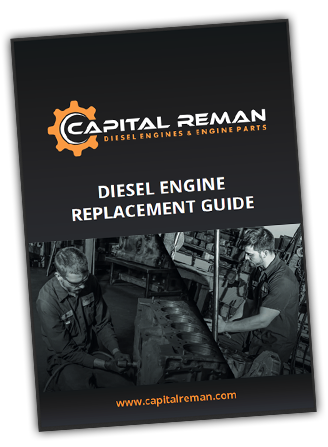- Do you offer remanufactured engines and parts for automotive vehicles?
- Do you offer high performance engines?
- Do you offer financing?
- How long is the break in process with a new engine?
- Do you install and service engines?
- What do you remanufacture in-house?
- Do you ship internationally?
- What is your typical freight charge?
- How long does the remanufacturing process take?
- What brands do you offer?
- What is your warranty policy?
- Do you use OEM or Aftermarket parts?
- What is the typical cost savings of Reman vs New Engine?
- What is the difference between Used, Rebuilt and Remanufactured Engines?
- What is a core?
- What is Remanufacturing?
Do you offer remanufactured engines and parts for automotive vehicles?
No, we only focus on heavy duty diesel here. On very rare occasions we will remanufacture light duty trucks (Dodge Cummins 5.9L, 6.7L, Ford Powerstroke, Chevy Duramax) but we like to focus on 8.0L engines and above.
Back to IndexDo you offer high performance engines?
We remanufacture the engines to your specific Serial and CPL numbers so that you get an exact replacement to the engine you currently have. This ensures that it is a ‘perfect fit’ every time. We do not remanufacture or modify the camshaft lift to increase performance, reprogram the ECU or make modifications to the turbo chargers. Any after sale modifications to the internal components or accessories of the engine (other than standard manufacturer grade) will void the warranty.
Back to IndexDo you offer financing?
We do offer financing options for customers who prefer that option. The benefits of include:
- Conserve your working capital
- Simple application /approval process
- Finance installation and training costs in one lease
- Potential tax savings under IRS Section 179
- $1 purchase option allows you to own the equipment at lease end
- Quick turnaround times on Credit Applications-Under $100,000
- Fixed monthly payments throughout term
- Trade up to new equipment
- Competitive lease rates
Fixed Payments: Unlike loans and credit cards, your lease payment is fixed throughout the term. It will not vary with interest rate changes. Fixed monthly payments make your equipment purchase more affordable without the up-front capital required for a cash sale.
Preserved Credit Lines: Your monthly lease payment does not affect your bank or credit lines. Most banks and credit card companies will reduce your existing available credit lines with every purchase via a credit card or loan.
Reduces Taxes: Unlike loan payments, lease payments may be deductible. Please consult your tax advisor to determine the deductibility of lease payments.
Back to IndexHow long is the break in process with a new engine?
Before your engine leaves our facility it is put through a rigorous quality control process. There are 20 steps between first payment and the ship date. Each department has it’s own quality control measures and there is a final quality control process of tolerance calibration, rockwell hardness, line-boring and magnafluxing. The engine will ship to you with instructions on a line card.
We recommend the first oil change take place at roughly 5,000 miles. Do not use synthetic oil for the first oil change but rather standard motor oil. It is important to get more than enough oil to the engine while it is settling to its final structural limits. During the first year the engine will heat and cool multiple times which will expand and contract the block and internal components. This is normal and why tolerances are set with in an acceptable range. We also recommend that you do not let the engine sit idle for long periods during the first 5,000 miles or push the engine at full load outside of the normal working conditions. Hard shifting or extreme acceleration is not recommended during the break-in period.
Back to IndexDo you install and service engines?
No, unfortunately we are not mechanics or a truck service shop. We are precision machinists and engine builders by trade however we can recommend various partners to help you install your new engine. If you have questions regarding problems with your engines we are more than happy to help give you our advice. Most of our part specialists have 20+ years experience in the industry.
Back to IndexWhat do you remanufacture in-house?
We remanufacture just about everything in house at our facility in Denver, Colorado. We are a full service AERA (Automotive Engine Rebilder Association) machine shop and engine manufacturing facility. The hard internal parts such as the camshaft, crankshaft, cylinder head, engine block, rocker assemblies, lifters and connecting rods are all assembled in-house. We use a trusted partner for turbos and injectors but everything else is done right here.
Back to IndexDo you ship internationally?
Yes we do! We have shipped engines and parts to New Zealand, Russia, Brazil, Canada and the Caribbean to name a few. Our shipping and parts experts have the experience to work with import/export brokers to get the job done for you.
Back to IndexWhat is your typical freight charge?
We build and ship a lot of engines every month, so much so that we get very good rates from our LTL Carrier, Estes. You would be surprised how cheap it is to ship a 3,000 lbs. engine across the country. We also have the ability to ship on your account. Parts less than 100 lbs. are shipped on UPS. Give us a call and we can give you an accurate shipping quote based on your zip code.
Back to IndexHow long does the remanufacturing process take?
We have two options when it comes to remanufactured engines: Repair & Return and Exchange. A Repair & Return engine is when you send us your core engine and we remanufacture your particular engine for you. The only stipulation is if the core is rebuildable. If there is a hole in the block then your core would not be in deemed acceptable for remanufacture. The other option is to buy an engine on an exchange process. An exchange process is where we use one of our cores to remanufacture an engine for you, then you send us your core when the engine is complete. You pay a core deposit that is returned to you when we receive your core. We have a very liberal core deposit policy based upon inspection of the core. If the condition of your core is reusable we will return your core deposit in full. If only part of your core is reusable we will pro-rate your deposit money. This process keeps our core bank up-to-date for future customers.
The remanufacturing process typically takes anywhere between 2-3 weeks depending on our production backlog. If you are looking for remanufactured parts such as cylinder heads, camshafts, rods or crankshafts the turnaround time is a day or two. Sometimes we have the particular part done already and can be shipped the day of sale. New aftermarket parts are typically shipped the day of sale and can be overnighted for expedited delivery.
Back to IndexWhat brands do you offer?
We can remanufacture just about any heavy duty diesel engine however we primarily focus on Caterpillar, Cummins, Detroit Diesel, John Deere and Mack. On occasion we will do a Komatsu, Waukesha, EMD, Mercedes Benz or Volvo engine. Our particular niche is Cummins ISX and Mack E-7 engines. We do more Mack engines that just about anyone in the country; even building engines for some Mack dealers. Give us a call if you have an engine you are not sure about and we can determine if it something we can do here in-house.
Back to IndexWhat is your warranty policy?
We have one of the strongest warranties in the remanufactured engine industry. Our warranty on remanufactured engines is for 12 months unlimited miles. The first 6 months include parts and labor and the second 6 months include parts replacement. We believe in standing behind our product and live and die by the quality of our work. We are more than happy to provide references of satisfied customers all around the world. You can read about our entire warranty process here.
Back to Index
Do you use OEM or Aftermarket parts?
We have the ability to use OEM parts if you request it for your engine build. However, we use aftermarket parts from some of the top companies in the industry such as Interstate McBee, PAI, IPD, Reliance Power Products, Maxiforce and more. These companies have been in business for 50+ years and are built on their reputation of being reliable. The failure rate on aftermarket parts is less than 1% overall. The same parts as the OEM are also manufactured for the aftermarket companies… the little known secret in the industry is that OEM parts just go in a different box. You can rest easy knowing the quality of the parts we use are top notch. We have hundreds of engines currently running all over the world on aftermarket parts with no issues whatsoever.
Back to IndexWhat is the typical cost savings of Reman vs New Engine?
On average we save the customer roughly 47% over the dealer on parts and engines. However, it is not uncommon for new engines to be two, three or even four times the price at the dealership. We had a customer who had two Cummins ISX engines he needed remanufactured. The first one he paid $36,000 more at the dealer than what he paid with us for his second engine. He wishes he would have heard about us earlier!
The fact is that we use the same parts, specifications and cores as the dealership however they charge a whole heck of a lot more. Our expert machinists and engines builders are all certified and the vast majority of them have worked for the dealerships themselves doing the same work. Why pay more for the exact same service?
Back to IndexWhat is the difference between Used, Rebuilt and Remanufactured Engines?
Used Engines
A used engine is an engine that has been directly removed from a vehicle or piece of equipment. Used engines or “runners” differ than cores because they will run as is vs. a core engine is a used engine that no longer runs and is in need of work. The used engines we supply at Capital Reman all come from reliable truck salvage facilities across the country. All of these engines are cleaned, inspected, run tested, and have the oil examined for particulate contamination. The hard internal parts of the engine such as the camshaft, crankshaft, rockers, injectors, turbo, cylinder head and block are also inspected for cracks and wear. Usually these engines come with a 60-90 day warranty and have a documented history of overhauls and maintenance. Used engines are a perfect fit for someone who needs to be up and running again within a few days.
Rebuilt Engines
Rebuilt engines are used running engines that are reconditioned through a deep cleaning, inspection of the internal components and replacement of worn or broken parts. Parts that are deemed operational are re-used if they are still within the original equipment manufacturer’s tolerance specifications. We typically do not sell rebuilt engines here at Capital Reman as we prefer to sell fully functioning remanufactured engines where we know 100% the quality of the product that is going out the door. That being said, a rebuilt option is available for a customer who wants to upgrade their current engine but doesn’t have the time or capability to fully remanufacture their engine.
Remanufactured Engines
Remanufactured engines are core engines that are rebuilt to make them as new as possible in accordance with the original engine manufacturer’s specifications. All components of remanufactured engines are machined to meet or exceed OEM specs. Capital Reman’s remanufactured engines consist of the cylinder head, engine block, castings, camshaft, crankshaft, connecting rods, rocker assemblies, gaskets, liners, rings and have the timing set. All major components are crafted to exact tolerances through precision machining. Quality control procedures ensure accuracy and that the product will work as needed. Capital Reman’s engines come with a 12 month unlimited miles warranty.
Back to IndexWhat is a core?
A “core” is an industry term for a used engine or part that has passed all of the necessary inspections tests and is acceptable for the remanufacturing process.
Back to IndexWhat is Remanufacturing?
Remanufacturing is the process of taking used engines/parts and essentially “remaking” them from the ground up. The remanufacuring process consists of machining the OEM parts of an engine with state-of-the-art industrial equipment to grind, weld, polish, line-bore, hone and essentially rebuild the part to the same or better quality than the day it left the factory years before. Remanufacturing follows strict OEM specifications so that the parts are an exact replacement of the original design. Quality control, expert machinists and a scientific approach is all extremely important in remanufacturing. Precision is key in remanufacturing with tolerances of .0001” needed in most cases to recreate the perfect fit.




